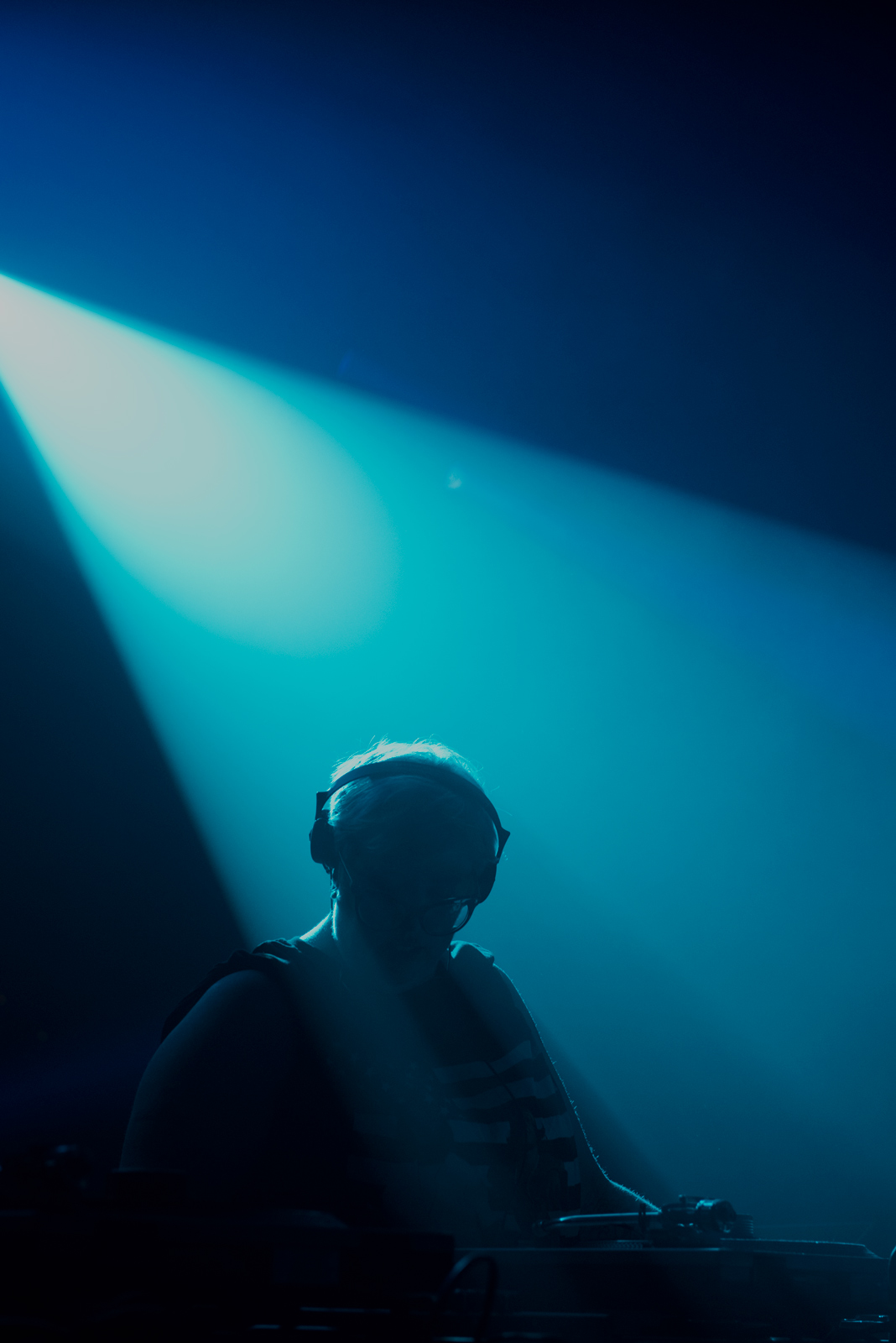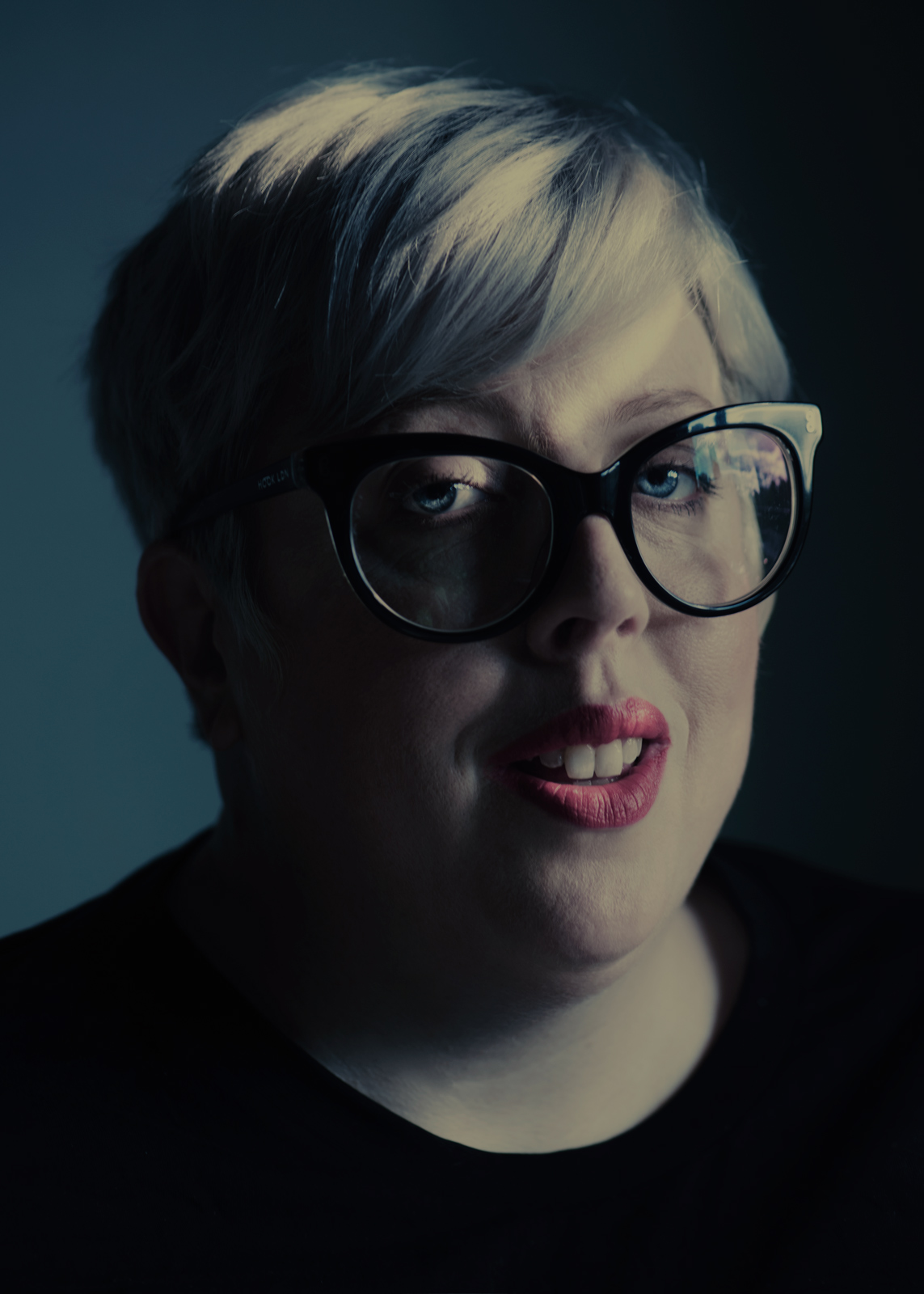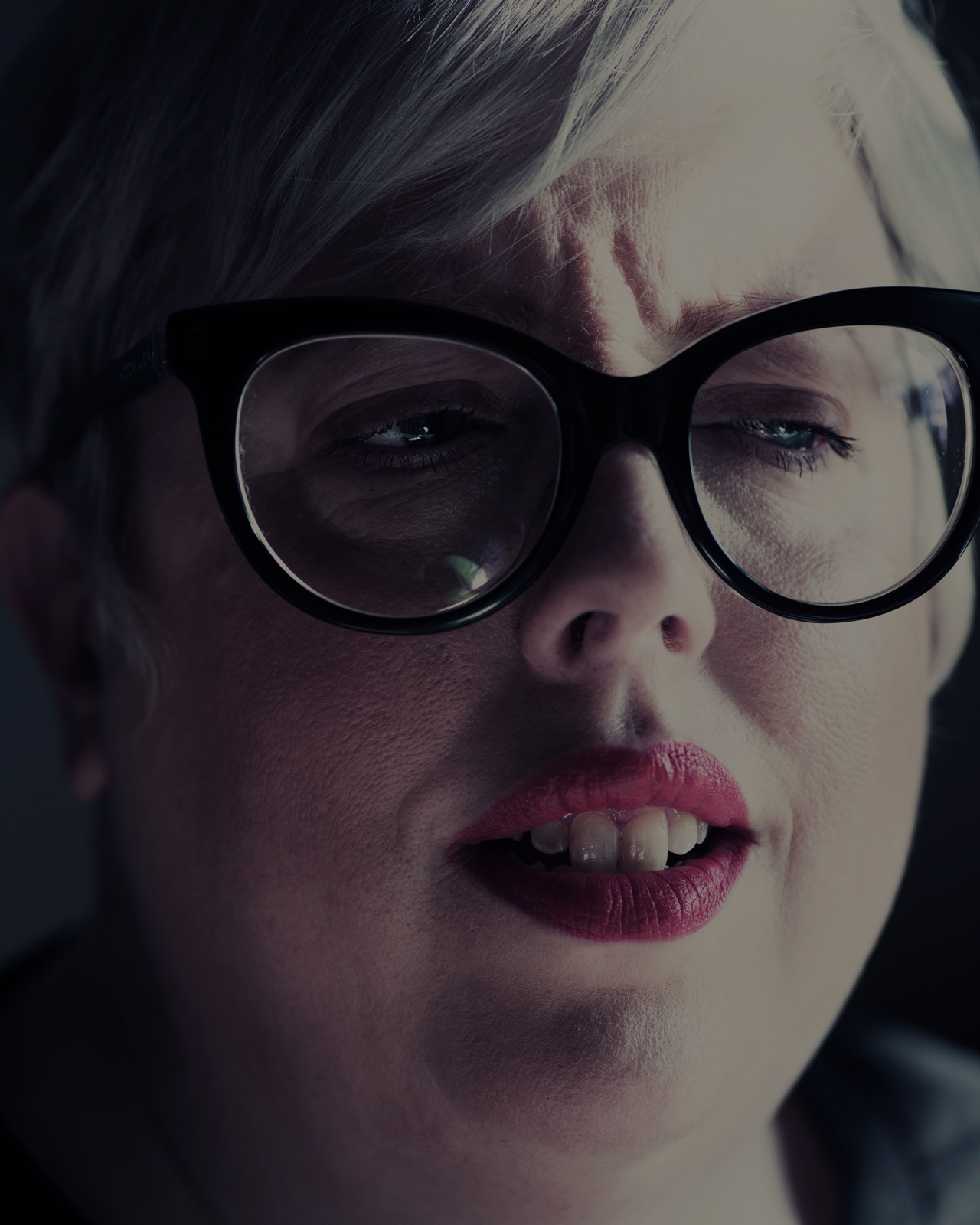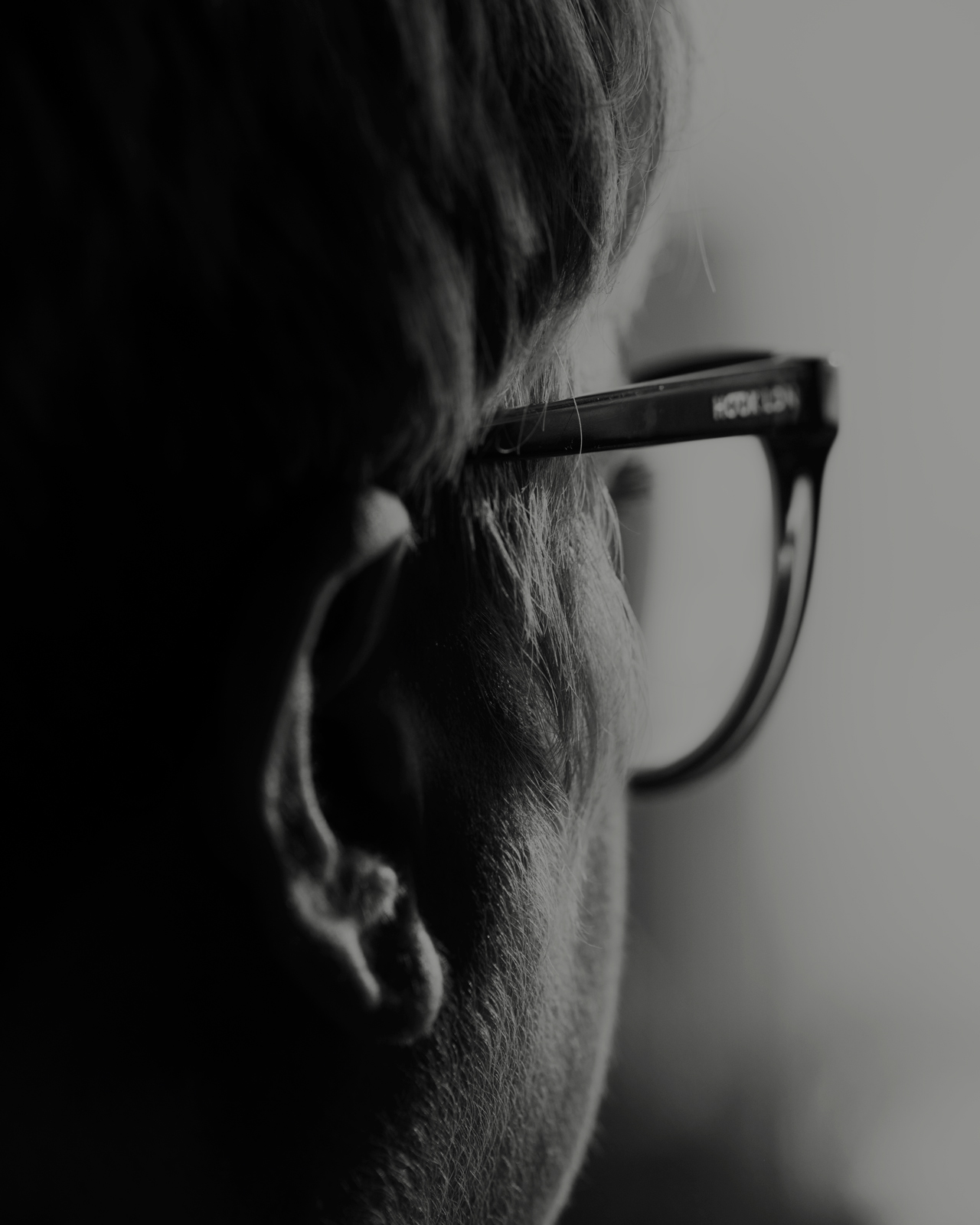Talking liberation theology, dick pics, and being a 'bad Catholic' with Marea Stamper, A.K.A. The Blessed Madonna.
One upshot of the internet’s impact on dance music is the collapse of geographic and cultural distances. SoundCloud exposes small town teens to new sounds and subcultures, file-sharing facilitates collaboration between beatmakers from disparate worlds who may never meet face-to-face. It’s a utopian standpoint, but rave culture has been drenched in rhetorical idealism since dial-up was a desired commodity, and even in today’s increasingly individualistic world, the only good artists are only doing it because there’s no alternative. To Marea Stamper, A.K.A. The Blessed Madonna, being a good DJ is still an ongoing quest for the collective experience of ecstasy.
As a white Catholic kid growing up in the Appalachian Kentucky of the ՚90s, Stamper wasn’t pursuing superstardom when she started carpooling across three state lines to hawk homemade underground DJ mixtapes from the trunk of a beat-up Corolla after witnessing the first official performance by Richie Hawtin’s Plastikman. (In fact she dreamed of being a nun.) Two decades later—plus numerous disenchanting DJ sets, under various forgotten aliases, at EDM-centric Juggalo dives during dance music’s 2000s dark age—Stamper suddenly burst onto the global stage in 2012, when her exhilarating Chicago house banger “Exodus” was debuted to a massive crowd by Derrick Carter at Detroit’s Movement Festival. “Exodus” had already been in high rotation amongst Chicago house superfans for three years. Carter, meanwhile, was a resident DJ at Smartbar, the independent Chicago venue where Stamper had worked as a talent booker, enthusiastically championing house music’s black, queer techno forebears.
At 41, Stamper is still Catholic, now married, and she finally owns a US passport. She’s also preparing to drop her debut album. “It’s been a really crazy five years,” Stamper exclaims, sitting cross-legged in her bed at Dumbo’s 1 Hotel a few hours before a B2B set with James Murphy at the Knockdown Center last month. “Five years ago I didn’t know how I was going to pay my rent. Life comes at you fast!” Stamper’s success isn’t random, but the result of her tenacious advocacy for the collective euphoria she once found in the fields and parking lots of ՚90s Ohio. And perhaps more crucially, in the Catholic church of her Kentucky childhood. Stamper’s world is an imperfect one by nature—“Dance music has always been fucked up, and it will always be fucked up, and I will always be fucked up!” she laughs—but it’s a world where anyone is welcome as long as they also Still Believe in it.
Hannah Ongley—I think I pushed passed your dad in the elevator, sorry! Did your parents come up here just to visit you?
Marea Stamper—Yeah. They’re going to go to the show tonight. We’re going to go to dinner with James after this and then go to the show. It will be really nice.
Hannah—That’s so cool. Do they join you on tour often?
Marea—Yeah, we’re a really tight family.
Hannah—You grew up Catholic, so I’m assuming your parents are Catholic too?
Marea—We’re all kind of bad Catholics. My step-dad—my mom’s husband—is not. But we’re sort of free-range Catholics, my mom and I. I think it probably in some ways stuck with me more than it did with her, as time has gone on. My grandfather was the real anchor for all of that stuff and when he passed, you know, when you have families that go to church, there’s kind of one person that you go with, who’s like ‘the person.’ And he was the guy. He was the guy who would sit up and watch the Pope on Christmas. But my mom and I, we went on a pilgrimage together a few years ago, to the shrine in Montserrat just outside of Barcelona. We’re still in it, baby!
Hannah—So you were raised on your grandfather’s church music? What else were your parents listening to?
Marea—Yeah! The great thing is that they all have such lovely taste, my grandfather included. From him, I get Keith Jarrett and all this amazing jazz, and from Roger and my mom—they’re just bibliographic. And my dad’s a musician. He’s a really smart guy; a virtuoso guitar player and an amazing songwriter.
Hannah—So much has been written about the connection between dance music and religion. Were you conscious of that connection when you became immersed in both worlds?
Marea–There’s a lot of lyrics in house music that are very much rooted in gospel traditions. There’s a lot of songs where you’ll hear them referencing a ‘he’ and it could be romance or it could be God, very easily, and it’s not totally clear which is which. There’s a lot of ambiguous lyrics in dance music that sort of sound like worship. Putting your hands up, all those things, correlate with church and especially with the concept of the holy spirit. Those are things that made sense to me, very much so.
I’m also very progressive. While our church in Jackson was very progressive also, that did not prove to be the case in the world at large. It’s tough to paint Catholics with a single brush because there’s a billion of them. It’s a very wide category of people—there are people whose Catholic faith has led them to be involved in civil rights, and there are people whose Catholic faith has led them to be enormous assholes about reproductive rights. Liberation theology is a really important part of our history, and it really resonates with me. I understand my faith as a map and a set of symbols and allegories and ideas that help me think about the world.
Hannah—It’s interesting that you bring up maps and allegories, which I first misheard as ‘algorithms.’ You’ve previously claimed that you’re a very practical person, not a radical person, and I’m wondering if your faith has something to do with that.
Marea—Yeah, for sure. In some ways I am the most traditional, boring human being on this earth. The center of my life is my family, here on tour right now with me are my best friends that I grew up with in Kentucky, and my mom and dad are here. Those are the people who come on the road with me. I don’t really have ‘club friends.’ If I do, they’re old clubbers like me, they’re all doctors and pharmacists and lawyers and moms and dads and whatevers. We’re all super chill people, and I’m in a very extremely normal marriage, as bizarre as both of us are. We couldn’t be more different. He is the Dark Lord—he has a giant upside-down cross tattooed on his chest [that reads], ‘Hard to Be a God,’ which is a really horrific Russian film.
“Dance music has always been fucked up, and it will always be fucked up, and I will always be fucked up. [Laughs]”
Hannah—What does he do?
Marea—Nothing! I retired him. He’s a wonderful housewife.
Hannah—You hear so much about the sanctity of a ‘found family’ in the club scene. Is that important to you too?
Marea—I have that too! I mean there’s no question. The people who are here right now—there’s one of my oldest friends who I met and took to a rave, and somebody I used to be in a dance crew with back in the ՚90s. I’m in a group chat with the people that I’ve been friends with for over 20 years and about once a week we all call each other at the same time and get, like, a five-square Skype session. We’ll just randomly call everyone at once: ‘How are we all doing?’ One guy’s a farmer now, he’s like, ‘Just driving to get some pigs!’
Hannah—Don’t worry, I have pig farmer family members in New Zealand. It’s exercise and fresh air! Actually, I was talking to a guy the other day who is really into running, and he was talking about ultra-marathons in terms of, like… not religion exactly, but almost meditation. I guess what I’m asking is if you can relate to that need for catharsis, as a musician and as a Catholic?
Marea—Yes, that part I really relate to. You know I’m a daily meditator? I just got back from a retreat in the alps; I spent almost seven days in silence, mostly. You have your little room and you go and meditate for four or five hours a day. I do that. In my house there’s a place [for meditation], and it’s the first thing I do—wake up at five thirty, six, sometimes seven; straight downstairs and into the meditation chair. It helps a lot—in this job, you can go so fast, learning to watch your own thoughts is a really valuable skill. To lessen your possession of them and to not feel so overwhelmed by whatever is coming or not coming, to get out of that state of always anticipating what’s next.
Hannah—Do you think about the importance of silence in music a lot more since you started meditating?
Marea—Yeah. We’re doing my album now, in some ways it’s really maximalist. I’ve been recording it for three years and it’s got, you know, arrangements for orchestras, Bob Weston from Shellac playing bass on it, just loads of people on this album. I’ve been writing all of the instrumentation, just sessions and sessions and sessions. Now I’m carving things out and trying to make space, to leave places of silence, just sitting and saying, ‘Remove every single thing that you can remove. Every single thing that you can remove should be removed.’ I think it’s not so different to writing—in The Elements of Style, ‘Eliminate unnecessary words.’ Not being so caught up in your head, or so attached to your ideas, to not clutch your own intellectual property so tightly. It is all about making space and silence, and letting go of the things that really are not serving the rest of it.
“There’s a lot of ambiguous lyrics in dance music that sort of sound like worship. Putting your hands up, all those things, correlate with church and especially with the concept of the holy spirit.”
Hannah—Was it difficult to learn to trust so many people with such an ambitious and personal project? You know, being an air quotes ’woman in dance music’ air quotes who has seen the industry from all sides, the fear of having your intellectual property being claimed by someone else isn’t an unfounded one.
Marea—That’s a very good question and a very astute observation. [Laughing] It is! I used to write with and for other people, and produce for other people, and a lot of times was uncredited. There are nastier ways to say that but I was very aware of. In the beginning, I was very afraid to let anyone in the room with me because I didn’t want anybody to be able to go, ‘That guy over there in the corner, he’s the guy that really made it.’
Hannah—That’s kind of exactly the scenario I was picturing. Every time you see a man and a woman in the studio you think, and I even catch myself thinking, ‘He must be, like, twiddling all the knobs, doing the mixing, whatever.’
Marea—Joni Mitchell made a thing about that. Any man that walked into the room while she was writing got a writing credit [laughs]. I probably botched that quote but that really became a thing. At first I gripped [my music] a little too tightly, I think. But over a period of three years, I really became so close with the people that did slowly come in. And also because I have such a wonderful relationship with my—I feel like there should be a word for him that doesn’t exist—he’s my tour manager but we learned to produce together, and DJ’ed together for over a decade. At first he was the only person that I trusted at all, but then other people started to come in, and it was so exciting to work with them that it felt okay to let it go.
Then I met this woman named Georgia Barnes, who’s on Domino, and who’s amazing. She and I went to have brunch together; it was love at first sight. We started working together and now she plays drums on the album. That was such a breakthrough moment. We’ve built this amazing family of musicians who became this unlikely band—people from monolithically important punk-rock bands, and house legends, and Georgia, and a Grammy Award-winning string arranger, and the House Gospel Choir, who are so phenomenal.
Hannah—It sounds epic, when is it out?
Marea—Next year it’ll be out. We’re getting ready to mix it down right now so it’s just [a matter] of cutting away. But your question was very good—it was very hard. And [the record] is so personal—it’s about my family, it’s about my dad, it’s about loss. It’s not so much a ‘hands in the air’… I mean, it is, but it’s more complicated than that. I didn’t want to just make a bunch of club tracks.
Hannah—Was it weird to start this insanely busy, successful career at a point where social media and everything already existed? Having already lived through the pre-internet era of rave culture?
Marea—Yeah, social media is a really hard thing in the beginning of this stuff. Entering that world—especially if you have a big, stupid mouth like I do. Somebody will say something like, ‘You’re fat.’ And I’ll be like, ‘You’re fat, I hope you die!’ I’ve always had that mentality of, ‘If they hit you, you have to hit them twice as hard.’ Which is not a good thing to do on the internet. You have to learn very quickly that you are not in control of what people think. So my Facebook is deactivated, I don’t have notifications up on my Twitter. I’ve kind of learned to engage it on my terms rather than at the terms of the world.
Hannah—The internet is supposed to be a great platform for underrepresented voices and for people in culturally or geographically isolated parts of the world. Are you any better off giving people a platform in the real world?
Marea—With the internet, I was able to connect to people that—if I had to go through traditional channels, it wouldn’t have happened. If I’d had to encounter those people directly, in the real world, there wouldn’t have been enough of them to care about what I thought. You’re not really geographically limited [online]. There would be enough people around the world gathered in one internet location for it to matter, or to care about the kind of record that I was making. The internet was an absolutely essential, no question about it; every single thing that was a breakthrough moment for me, there was some component of it that was attached to some kind of online community. There’s obviously a lot of really problematic elements to internet culture right now, especially for women, and the hard part of that came very hard and very fast. The first time [you realize that] this is no longer your private thing—that’s a real wake-up call.
Hannah—And all that blew up about the same time as you started to be a legitimately famous person.
Marea—It did, it did. It happened very quickly. And there were a few moments that were real clarifying for me. Things like having to say to my family, ‘Mom, somebody’s going to show up on my Facebook page and say something really terrible, and you should not talk to them.’ Or people adding my parents on Facebook—that was one thing that happened.
The truth of it is though that 99% of the time it’s incredibly sweet and good. The feeling that I’m generally left with is that I’m really honored to be a part of people’s lives, particularly at a time where, if we look back at dance music, there was such a sea change. In terms of women entering and the culture kind of shifting back towards the original roots and ideals, there has been a pretty phenomenal thing happening in the last few years. Is it perfect? No. Is it still fucked up? Yes. It will always be fucked up. Dance music has always been fucked up, and it will always be fucked up, and I will always be fucked up. [Laughs] I will always be completely imperfect and not a very good role model for anyone who is actually paying attention, God bless them! There was a guy today that sent me a little thing about his daughter, she was, like, three years old, saying, ‘Oh, DJing, isn’t that what women do?’ Because all of the DJs she had seen [were women]. For her, the whole expectation was flipped. I couldn’t even have imagined that world, at one point. I think that’s the main thing I have come away with. And, dick pics. Some really startlingly ugly phalluses.



























